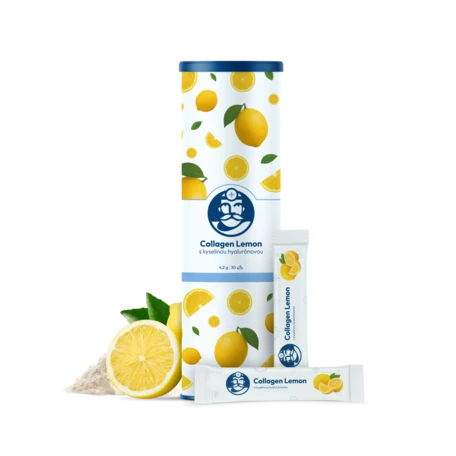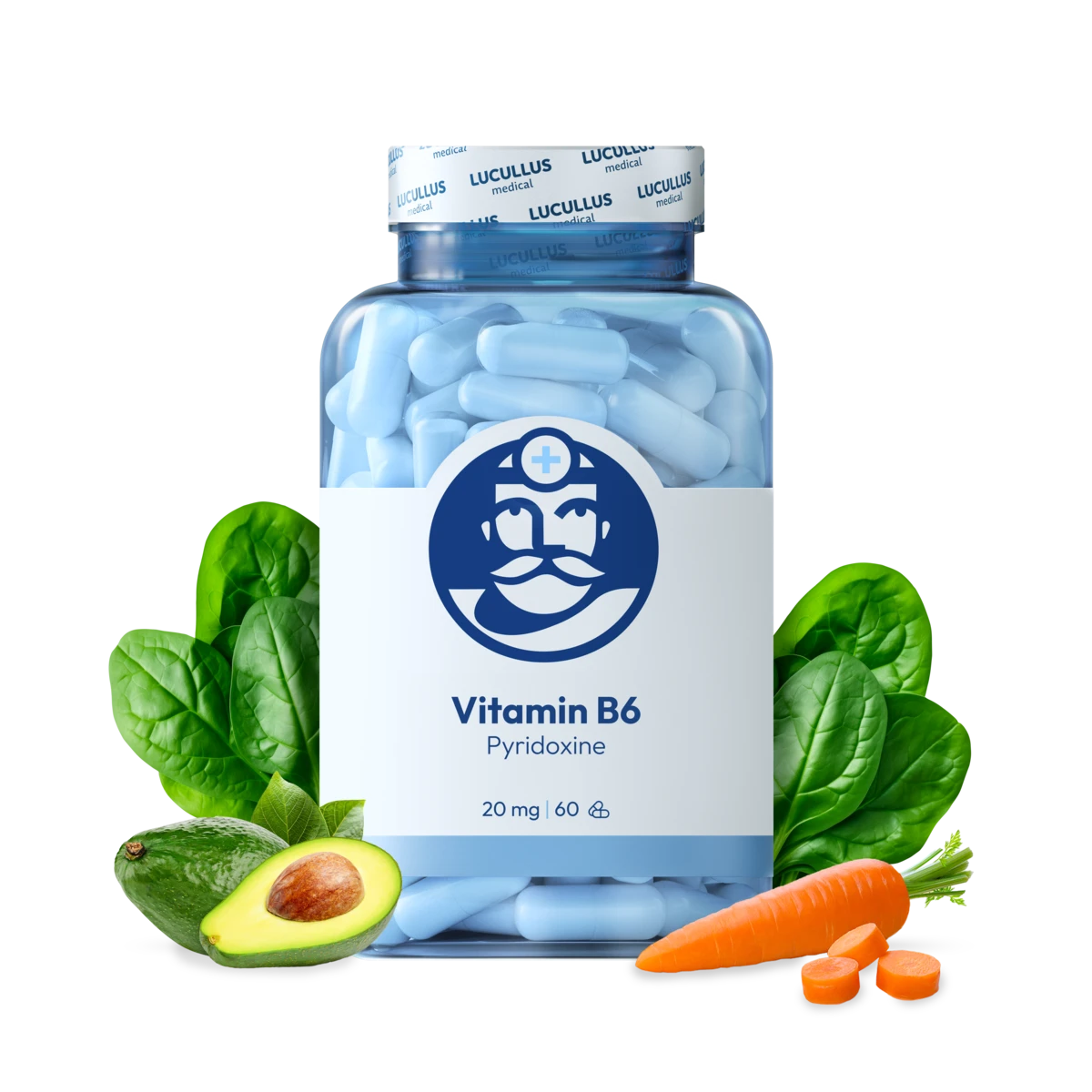
Účinky
Support for skin elasticityImprovement of skin hydrationFlexibility and mobility of jointsTissue regenerationProtection against oxidative stress
Pack of 60 capsules
| Active ingredient | In daily dose | % Ref |
|---|---|---|
| Vitamin B6 (pyridoxine hydrochloride) | 20 mg | 1428.57% |
Ingredients: Vitamin B6 (pyridoxine hydrochloride), bulking agent: magnesium carbonate, microcrystalline cellulose, capsule made from gelatin.
Discover a natural source of vitality and mental well-being with pure and effective Vitamin B6
Fatigue, irritability and poor concentration are among the most common symptoms of vitamin B6 deficiency. This essential micronutrient is necessary for energy production, nervous system balance and proper immune function. Vitamin B6 capsules provide a precisely dosed, highly absorbable form that supports the effective functioning of the body every day.
Vitamin B6 acts as a coenzyme in more than 100 enzymatic processes in the body – from amino acid formation to glucose metabolism regulation. It supports the synthesis of serotonin, dopamine and GABA, which affect mood, memory and quality sleep. It also plays a key role in converting glycogen to glucose, stabilising energy levels throughout the day. It supports haemoglobin production, strengthens immunity and, thanks to its high absorption rate, has a complex effect – helping to manage stress, reduce fatigue and promote overall mental well-being.
Take 1 capsule daily, ideally with a meal. The product is manufactured in Slovakia with an emphasis on purity, safety and effectiveness. It is GMO-free, gluten-free, lactose-free and colouring-free. Each batch undergoes laboratory testing for stability and purity.
Regain your energy and mental freshness. Support your immunity, hormonal balance and mental resilience naturally – with premium Vitamin B6. Each capsule is a step towards greater vitality and well-being.

Read the latest news about quality dietary supplements, vitamins, immunity, and health.

Ak ste aktívny na sociálnych sieťach, tak pojem Pestrec mariánsky už určite poznáte. Je to fenomén roka 2024, reklamy na túto "zázračnú bylinu" sú na každom kroku. Na rozdiel od iných výživových doplnkov, nie je nikto, kto by účinky tejto rastliny spochybňoval. Rôznia sa iba názory na jednotlivé produkty a spôsoby ich spracovania. V čom spočíva zázrak tohto bodliaka?

This remarkable plant (Lepidium mayenii) from the Peruvian Andes, where it is grown at extreme altitudes (4000 m a.s.l.). It is incredibly resilient and can survive and grow in conditions where most other plant species would not survive, such as low temperatures, strong winds, and intense UV radiation. Its ability to adapt to harsh environments enriches it with nutrients and substances that positively impact the human body, enhancing resistance to both physical and mental stress.

“Is it just another vitamin... or?” one might think, but the more we learn about pantothenic acid, the more it fascinates us. Vitamin B5 plays a crucial role in converting food into energy, supports concentration, mental well-being, and even skin regeneration. Without it, the body would not be able to properly produce hormones or fight stress. It is also a substance that is hidden in every cell of our body, accompanies us from birth, and contributes to sufficient energy, skin health, and mental acuity. Although we may overlook it, its importance is undeniable, and its name is no coincidence. It comes from the Greek word “panto”, meaning “everywhere.” And indeed, it is omnipresent, irreplaceable, and somewhat mysterious. If we start exploring where this essential vitamin is found, it's in eggs, nuts, whole grains, shellfish, avocados, salmon, liver, kidneys, beef, yeast, vegetables... And if we've just realized that our diet is low in these foods, we should consider supplementing B5. After just a few days, we would notice a change. We would wake up with more energy, have a clearer mind, and even see an improvement in our skin. Colleagues would notice that we work faster, are more creative, and less stressed. Pantothenic acid will help us get back in shape. And for us, it will no longer be just another substance on the list of vitamins.

Predstavte si, že vaše telo je továreň pracujúca na najvyššie obrátky, (aby zabezpečila energiu, rast, opravu buniek) a železo je palivo, ktoré udržiava jej chod. Ak sa vyčerpávajú zásoby železa ihneď, slabosť, búšenie srdca či bledšiu kožu. Príznaky nedostatku železa sú lámavé nechty, suché vlasy, dýchavičnosť, problémy so spánkom, znížená koncentrácia, studené končatiny, zvýšená frekvencia infekcie a anémia (nedostatok červených krviniek spôsobený príliš malým množstvom železa v tele) ktorá sa prejavuje extrémnou únavou. Pri anémií telo nie je dostatočne zásobovaný kyslík a rýchlo sa vyčerpáva. Signál nedostatku železa môže byť aj tvorba modrín, pretože tento minerál je dôležitý pri tvorbe hemoínu, ktorý podporuje správnu funkciu krvných doštičiek.

Histamine is often perceived negatively, especially for its role in allergic reactions and intolerance. As with many things in life, black-and-white thinking is not suitable for this biogenic amine. As a neurotransmitter, it participates in many critical processes. In defending the body, for example, it supports the enlargement of blood vessels, making it easier for immune cells to access the site of inflammation. At the same time, it stimulates the production of gastric juices (essential for food processing), regulates the sleep cycle, controls appetite, and plays a role in learning, memory, and emotions. Histamine naturally occurs in the human body, and its balance is crucial for health. In the digestive system, it's broken down by the enzyme diamine oxidase. However, if histamine intake is greater than the body can break down, histamine intolerance develops. This imbalance can be caused by stress, poor lifestyle, medicines, or other factors. Excess histamine can lead to unpleasant symptoms, often resembling food allergies or digestive issues. It's essential to understand histamine as an important helper in our body.

The “yellow spark” that powers our body is vitamin B2 - riboflavin, (from Latin flavus “yellow”) was first isolated from milk and initially named lactoflavin. Its uniqueness was noticed by scientists due to its natural fluorescence under UV light, which helped them better understand its distribution in nature. But it wasn't just its mysterious light that attracted scientists' attention. It holds the power to transform food into life force. Riboflavin, aka vitamin B2, is not just a pretty fluorescent molecule, but it is important in cellular metabolism.